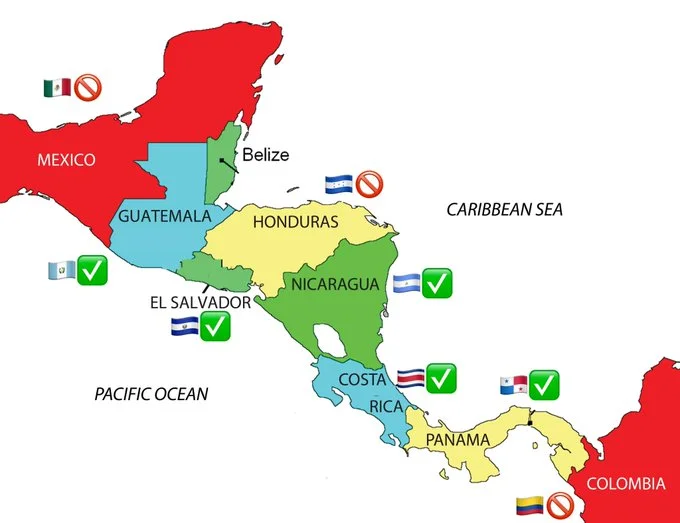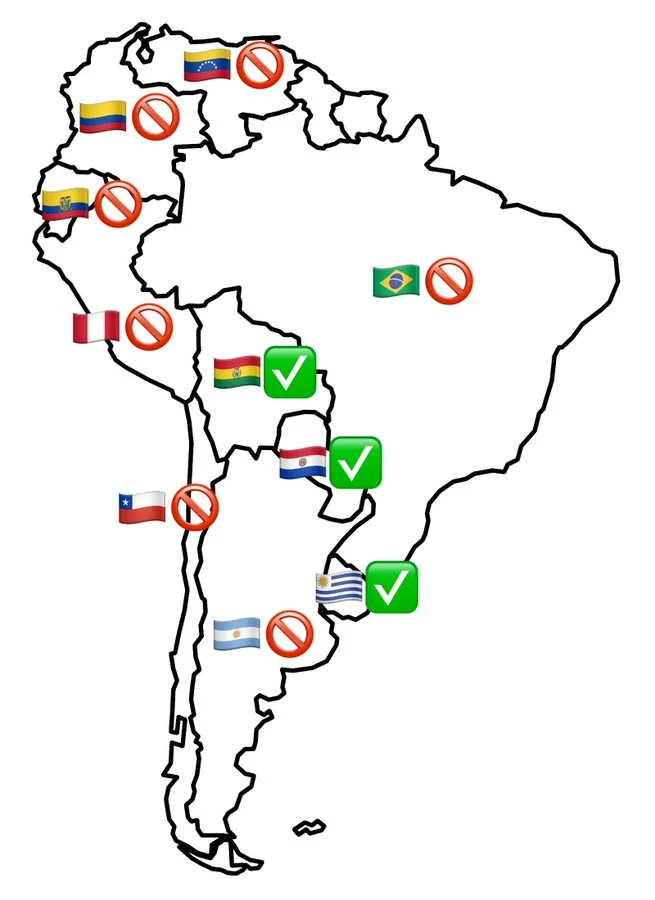Non-Americans, this one is for you. And I’m not going to pussyfoot around it.
(As an American citizen, I hope and pray every day to the nationality gods that I have this opportunity. But alas, I would have to make an irreversible, life-changing decision I’m still a bit too young for.)
If you want to reduce your taxes to single digits next year, follow these 3 completely legal steps below…
One note: This is not tax, financial or legal advice and should never be considered so. Please consult your tax accountant before making any serious or unserious decisions.
Some ground rules
Citizenship-based taxation, residency-based taxation, and territorial taxation. Do you know the difference between the three?
- Citizenship-based — This is dangerous. If you’re not currently a citizen of a citizenship-based taxation jurisdiction, don’t become one. These countries will tax you no matter where you live or work or spend time or become a tax resident. And surprise! Only two countries in the entire world do this – the Land of the Free 🇺🇸 and war-torn Eritrea 🇪🇷.
- Residency-based — If you spend more than half of the year (usually) or establish economic ties in their jurisdiction, you become a tax resident. But if you limit your time and dependence on the country, you don’t.
- Territorial — Some jurisdictions tax only your locally-sourced income and do not tax your foreign-sourced income. This means that once you make this jurisdiction your new tax residence, you can work remotely from their country and not pay a dime.
So what’s tax residence? Well, let’s explain the difference between a legal residence and tax residence:
- Physical residence — This is where you have citizenship or a residence permit (visa) and can stay as long as you’d like. However, this jurisdiction may not be tax-friendly, so you want to avoid becoming a tax resident here.
- Tax residence — This is where you spend more than 6 months in any contiguous 12-month period, establish economic ties, or have a permanent home. Therefore, it’s also where you pay taxes (because, yes, you do need to pay taxes somewhere). Be careful about where you invest your time and capital because tax authorities may make you regret a decision.
Ideally, if you’re not from the United States and aren’t subject to citizenship-based taxation, your physical residence and tax residence are in the same country.
Why? Because your physical residence is tax-friendly and you can claim it as your tax residency by staying more than half of the year or establishing economic ties there.
However, there’s a caveat to all this information: Each country differs, and what’s written in the law isn’t always what’s practiced in reality. If you’re going to invest time or money in a country, it’s best to speak to a local accountant about your situation.
All right, so assuming you’re from Canada, Latin America, Europe or Australia (where most of my readers outside the U.S. are from), here’s how you can eliminate those pesky taxes from your life.
1. Cut economic ties with your previous high-tax country
This first step is often left off guru’s “steps to zero taxes.” And without it, sorry. You’re more likely to pay taxes in two countries than zero taxes at all, if you skip this step.
Essentially, tax optimization requires more than just moving physically. You have to show your previous tax residence that you are no longer a tax resident in their country. This is called “severing economic ties.”
Sounds dramatic, but it isn’t.
Severing economic ties comes down to a few general activities in your previous tax residence country:
- Selling or renting out your property
- Deregister from local services and utilities
- Change your permanent address
Really, you just need to show the tax authorities that you do not depend on them for a majority of the year anymore.
By doing this and physically spending more than half of the year outside of the jurisdiction, you all-but ensure that your home country cannot claim you as a tax resident and subject you to its taxes.
Not doing this correctly can result in your previous country continuing to tax you and your new country taxing you as well. UGH! That’s a tax nightmare.
2. Establish economic ties in a new tax residency
Okay, now that you’ve cut economic ties with your previous tax residence, you need to show global tax authorities that you’re a tax resident somewhere.
(I could go on and on about becoming stateless and not paying taxes anywhere, but that’s a story for another time.)
Ideally, you’d want to become a tax resident in a tax-friendly place. Maybe even tax-free in the case they don’t tax foreign-sourced income. And there are many territorial tax systems to choose from.
That’s why a key element of this process is to continue working your remote job or continue growing your online business (that’s headquartered in your home country or the tax haven US (if you’re not a US citizen)). Why?
These territorial tax systems will not levy taxes on any income that’s earned from sources or from customers outside their country. They only tax those who earn money from their labor, their products, their services, etc.
Nice 👍
That means once you spend more than 6 months in a territorial tax country in a contiguous 12-month period, you can claim it as your tax residency. (However, check out each country’s specific rules and regulations.)
These countries offer a really straightforward path to significantly reducing your tax burden. All you have to do is work remotely from their country, spend more than 6 months there each year (4 months in the case of Paraguay), and claim their tax residency.
Then zero taxes! Right?
Not so fast. To establish that new country as your tax residency and “center of your economic life” (as my friend Jerz puts it here), you have to check a few boxes.
Your previous tax residency will make sure your “economic life” is elsewhere now that you’ve cut ties with them. That’s why many of the items on Jerz’s list are the same items that we cut from your previous tax residency.
Choosing the right jurisdiction
If you’re looking to Latin America, one of the most tax-friendly regions in the world, know this info:
Central America is generally tax-friendly. All of the following countries operate territorial tax systems, meaning they do not tax foreign-earned income:
- 🇨🇷 Costa Rica
- 🇸🇻 El Salvador
- 🇬🇹 Guatemala
- 🇳🇮 Nicaragua
- 🇵🇦 Panama

If you work a remote job from outside the country or run an online business headquartered outside the country, your income from those activities will not be taxed in these countries.
Again, very nice 👍
South America, on the other hand, is less tax-friendly. But a few countries in the continent do not tax foreign-sourced income either:
- 🇧🇴 Bolivia
- 🇨🇱 Chile (tax holiday for 3 years)
- 🇵🇾 Paraguay
- 🇺🇾 Uruguay (tax holiday for 10 years)

In other countries in Latin America, you may be able to reduce your taxes legally to zero with the right setup. However, it would require some complicated business structures and processes.
Avoid tax hells like Brazil 🇧🇷 , where not only is worldwide income taxed but tax enforcement capacity is high (more on that below).
Understand the tax enforcement capacity
In most Latin American countries, save for Brazil, Uruguay 🇺🇾 , and maybe Colombia 🇨🇴 , tax enforcement capacity is low. This means their internal revenue agencies are relatively disorganized, which can be advantageous for you.
This low enforcement capacity can provide you with more flexibility and fewer chances of being audited or scrutinized. However, relying solely on this can be risky if tax laws change or enforcement becomes stricter.
Generally, it’s best to stick with the law and avoid any tax hells at all. Especially when there are such great tax-free jurisdictions a short flight away.
3. Enjoy the benefits of tax-friendly (or even tax-free) living
Now, once you’ve cut ties with your high-tax jurisdiction and established ties with your new low- or even zero-tax jurisdiction, you’re golden.
You no long have to fund foreign wars, indoctrination in our schools, and gender reassignment surgeries for people you don’t know.
Yay.
Obviously, zero taxes is much more than that. You get to keep all that money you rightfully earned and spend it how you want. Likely in a much more efficient, capitalistic manner than the government would.
This is what American citizens, like me, can dream about. I’m happy for you 😊
If you want to learn more about achieving 0% tax living and living abroad in Latin America, check out all our resources in the Freedom Files.
Americans, check out how I have saved hundreds of thousands in taxes since I left my home country a few years ago.
Just a reminder. This is not tax, financial or legal advice and should never be considered so. Please consult your tax accountant before making any serious or unserious decisions.


